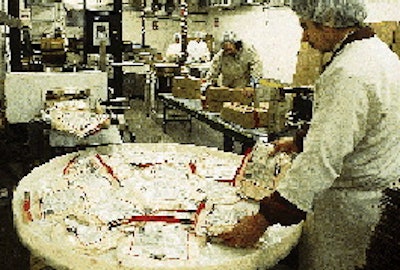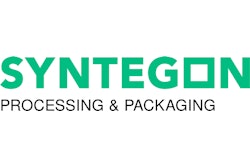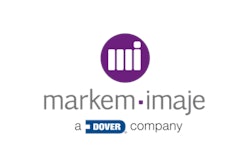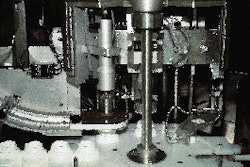When John Hodder first became plant manager at La Siesta Foods in Wichita, KS, he discovered the local population didn't know much about tortillas. Nor did the plant have a reliable way to date-code packs of tortillas.
"When I first arrived here, the locals thought that 'corn tortillas' was just another name for cornbread sliced real thin," Hodder quips. At the time, the packaging line was marking each package with a date code using a roll-on coder. Hodder initiated a project to test and evaluate coding devices, and eventually the company selected an ink-jet coder made by Markem Corp. (Nashua, NH).
"We did a lot of testing of competitive coding devices," says Hodder. "We selected the Markem ink-jet coders based on their dry ink system, because we need a pretty high throughput."
Right now, the line employing the new coder manually packs about 2ꯠ packages/hr. For the food industry in general, that's not real fast, Hodder laments, but that's because the tortilla industry by nature has been slow to modernize its packaging operations. Last year, La Siesta became a beta site for testing Markem's new Model 9064 ink-jet coder.
Why La Siesta? Hodder explains that the tortilla plant has one of the most hostile environments in the food business for any type of electronic marking or coding equipment. When testing began, he continues, flour dusting was a problem. In addition, plant temperatures fluctuate quite a bit from 40°F in the winter to 115°F in the summer. "So any equipment we have has to face some tough conditions," says Hodder. Some plant remodeling last summer, including air flow control, has eased the problem of flour dust.
Sanitation is key
Although a bakery like La Siesta doesn't actually need washdown-capable machines, it does require it for the equipment it purchases. La Siesta is a unit of Beaverton, OR-based Reser Foods, which operates four different plants in Wichita. The other three, says Hodder, are all inspected by the U.S. Department of Agriculture (requiring washdown-type equipment), and the plants like to be able to interchange equipment.
The plant wasn't sure that the original model could be washed down. "Now, we know these are made to be cleaned so we can wash them down," the plant manager says. "So they're far more attractive to food plants."
The new model's stand doesn't have catch-points, so there is almost no opportunity for product to build up on it. The low-ink warning light was moved from the outside of the column to the inside to eliminate other surfaces that could trap particles.
The patented Touch Dry ink system also enhances sanitation in the plant. The dry ink creates no mess, spills or clean-up problems, La Siesta reports. "The workers don't get it on their clothes or hands. In the food industry, we're required to use inks that will be readily absorbed into the substrate, but they'll also be readily absorbed into the skin too," says Hodder. "This system is not just clean, it's also easy to use. You just throw a block of ink into the reservoir and it's ready to go."
Modern, not automated
Following a major renovation, La Siesta has modernized its baking process. Packaging is now performed in its own climate-controlled room.
Direct from the oven, the tortillas accumulate in new counter-stackers. Two workers pick them them up gently and load them into premade printed bags. The bags are placed on a conveyor that carries them through a heat sealer from Doboy (New Richmond, WI), a machine with considerable history in the plant.
Once sealed, the bags are conveyed underneath the printhead of the Markem. It prints a three-line code date message and the package continues through a metal detector. Finished packages are ejected onto a round turntable.
"We don't have preset conveyor speeds. All of our conveyors are variable-speed, depending on the product," Hodder points out. "And our sealer and coder automatically adjust with the changes in the speed of the conveyor. We trigger the coder off a sensor that detects the package."
Most products use a three-line code; several, though, use only a single line. On the majority of the products, the legend reads "best before," with the actual date on the second line. Then the third line prints the line and shift designations. The date is actually computed by the coder's control system.
The portability of the ink-jet coders is also important to La Siesta. The bakery may operate two packaging lines, yet pack four different products. So the coders have to be able to be moved into position wherever packs are being sealed. "We don't like to have a lot of components that have to be moved, we need flexibility," says Hodder.
Special protective case
At the turntable, a worker picks up groups of three packages for loading into the shipping case. The box loader puts three packages in one side and three more in the other compartment.
A winged divider in the case helps protect the bags from damage. A vertical divider is already in the box for top-load strength. "The packer then loads a U-shaped divider above each group of packages with the wings facing upward. Two more groups of three packages are placed onto the wings.
After the case is sealed and coded, the case is inverted so that the wings now provide platforms for the upper three packs of product in each side. "Keep in mind these bread products are fragile, so we don't want them crushed," Hodder points out.
From a plant manager's point of view, Hodder concludes that the coder was designed to respond to his needs. "They made this unit so that you can clean it easily, they made it so that it works all the time, they made it very portable; and they made it so it doesn't create a mess."





























